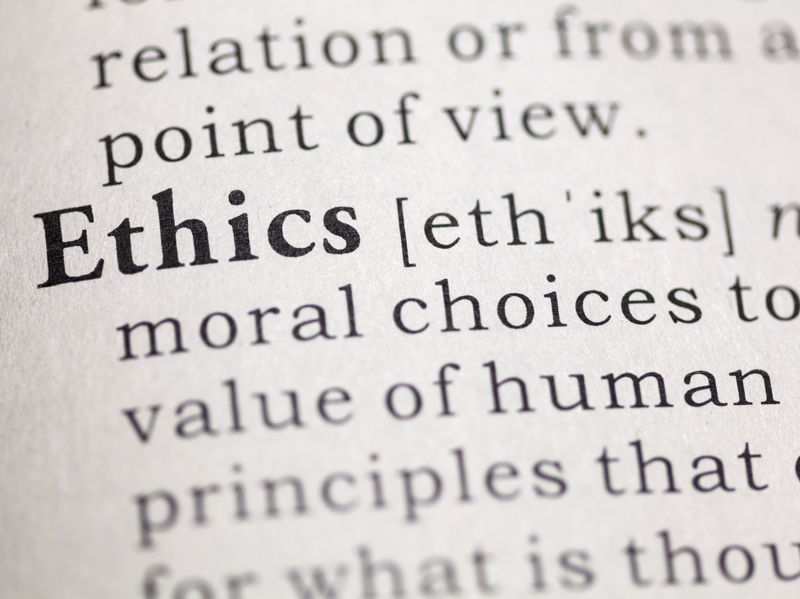The First Spiritual Exercises Code of Ethics

Responsibility toward oneself
(a) Givers of the FSE maintain their own life of faith and prayer.
(b) Givers of the FSE act responsibly in their own faith community.
(c) Givers of the FSE seek spiritual conversation with a mentor when needed.
Responsibility toward society
(a) Givers of the FSE represent their qualifications accurately in any public communication.
(b) Givers of the FSE do not make statements that contain any of the following:
(i) A false, fraudulent, misleading, deceptive or unfair statement;
(ii) A misrepresentation of fact or a statement likely to mislead or deceive
because in context it makes only a partial disclosure of relevant facts;
(iii) A testimonial from a receiver, without permission of that receiver, regarding the quality of spiritual conversation received from the giver of the FSE;
(iv) A statement intended or likely to create false or unjustified expectations of favorable results of making the FSE;
(v) A statement implying unusual, unique, or one-of-a-kind abilities, including misrepresentation through sensationalism, exaggeration, or superficiality;
(vi) A statement intended or likely to exploit a receiver’s fears, anxieties or emotions;
(vii) A statement about the comparative desirability of the spiritual conversation offered;
(viii) A statement of direct solicitation of individual receivers.
(c) Givers of the FSE conform to legislation requiring the disclosure of information to public authorities in cases of abuse, danger or crime.
Responsibility toward receivers
(a) Givers of the FSE always give the FSE free of cost or financial gain.
(b) Givers of the FSE discuss with prospective receivers:
(i) The nature of the FSE;
(ii) The respective roles of the giver and the receiver;
(iii) The length and frequency of spiritual conversation sessions;
(iv) Confidentiality and its limitations;
(v) Freedom of both parties to terminate the relationship.
(c) New Givers of the FSE will work under a mentor when giving FSE retreats.
(d) Givers of the FSE limit the number of receivers they accept to that which is reasonably possible.
(e) Givers of the FSE will help receivers to seek a qualified minister, pastoral associate, spiritual director, or counselor when asked for or needed.
(f) Givers of the FSE who have other professional qualifications and clients (such as counselors) ensure that they clarify with receiver the nature of their relationship as a Giver of the FSE.
(g) A Giver of the FSE respects the dignity of the Receiver by:
(i) Respecting the Receiver’s life story, values, conscience and spirituality;
(ii) Limiting inquiry into the personal life of the Receiver to those matters directly relevant to the making of the FSE;
(iii) Avoid exploitation in the relationship between a Giver and the Receiver of the FSE;
(iv) Refraining from behavior that is sexualized, manipulative, abusive or coercive;
(v) Maintaining appropriate physical and psychological boundaries.
(h) A Giver of the FSE respects the privacy of the Receiver by:
(i) Protecting the identity of the Receiver, and the fact of him or her receiving the FSE;
(ii) Keeping confidential all oral communications and making no written notes;
(iii) Not giving or receiving from Givers, mentors, spiritual directors, professionals or ministers, information about their Receiver without her or his written permission.
(iv) Conducting spiritual conversation meetings in an appropriate location;
(v) Ensuring that both the Giver and the Receiver of the FSE are aware of any legal requirements that may override confidentiality, including, but not limited to, provisions about child abuse, sexual assault of children or adults, elder abuse and physical harm to self and others, and other criminal behaviours.
Responsibility toward faith communities
(a) Givers of the FSE are sensitive to the faith traditions to which their receivers belong.
(b) Givers of the FSE do not engage in any proselytizing that is directed toward changing the commitment of a receiver to the giver’s faith community.
Responsibility toward spiritual seekers
(a) Givers of the FSE welcome, without judgement, any searchers who inquire about the FSE.
(b) Givers of the FSE accept and support searchers in their journey.
Terms used:
The one giving the FSE to another is called the giver. The one making a FSE retreat is called the receiver.
The form of guided reflection after prayer in the FSE is called spiritual conversation. It requires training.
The one guiding the giver of the FSE during his or her initial retreats is called the Mentor.
The one who trains a giver of the FSE is called a trainer.
The description ‘Giver of the FSE’ in the code applies equally to the Mentor and Trainer of the FSE.
The above terms are made in distinction from the terms used for the Full Spiritual Exercises. There, the one giving the Full Spiritual Exercises is called the spiritual director. The one making the Full Exercises is called the exercitant or retreatant. The form of guided reflection after prayer in the Full Exercises is called spiritual direction. It requires professional training.